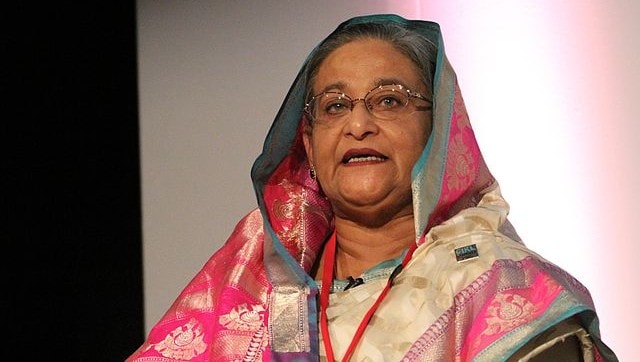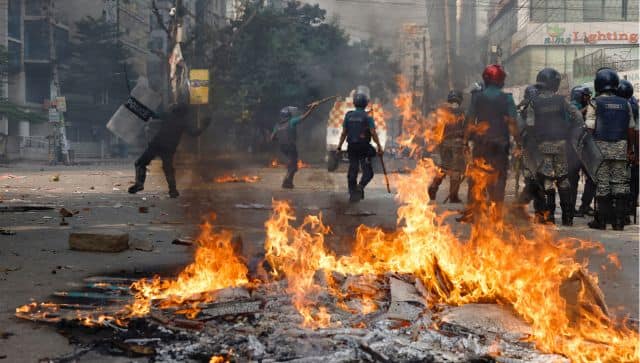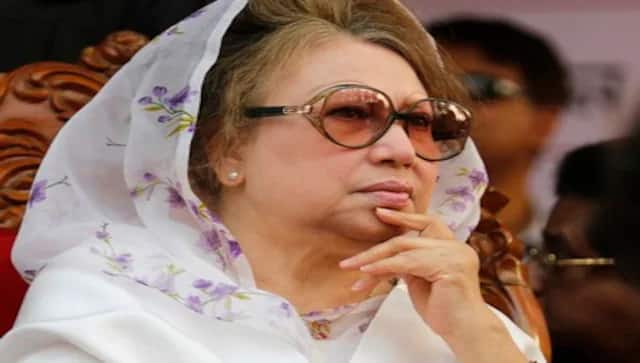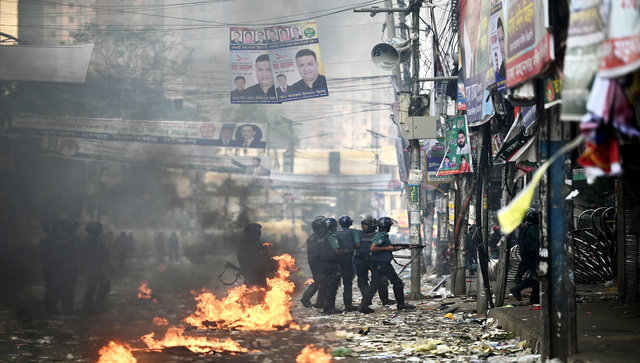Sunday witnessed two Opposition politicos being arrested in Bangladesh over the death of a policeman in violent protests. Over 100 people including police and journalists were injured and multiple vehicles torched as the Opposition called a nationwide strike against Prime Minister Sheikh Hasina. But why has Bangladesh been engulfed by anti-government protests? Let’s take a closer look: Why is this happening? At the heart of the protest is the demand for the upcoming polls, which are slated for January 2024, to be held under a neutral caretaker regime. This what the main Opposition Bangladesh National Party (BNP), which has been out of sorts since its leader and former prime minister Khaleda Zia – the main rival of Hasina who was imprisoned in 2018 on graft charges – has been demanding. The BNP wants Hasina, who is also the daughter of the country’s first president, to resign as prime minister as it believes free and fair polls cannot possibly take place under her regime. “BNP’s one-point demand is the restoration of democracy in Bangladesh…. This can only be achieved through a free and fair election, which is not possible under the current regime,” senior BNP leader Abdul Moyeen Khan told Reuters. “This government must resign and make way for a free and fair election under an interim government, only through that we can restore a people’s government in Bangladesh,” he added.
The BNP’s worries about elections appear well founded.
Hasina, who took power in 2009, has kept Bangladesh on a tight leash. [caption id=“attachment_13266652” align=“alignnone” width=“640”] Bangladesh prime minister Sheikh Hasina. Image courtesy Wikimedia Commons[/caption] Her critics accuse her of violating human rights, destroying the freedom of the press and suppressing dissent as well as jailing critics including many supporters of the main Opposition. Khaleda, who was jailed in 2018, has been allowed to remain at her home in Dhaka under a special provision since the outbreak of the COVID-19 pandemic. However, Khaleda is not allowed take part in any political movement. The Hasina regime in the 2018 and 2014 polls was accused of vote rigging and targeting its political opponents. Hasina’s government has denied those charges. It has also dismissed concerns about upcoming polls. Hasina, who hopes to return to power for a fourth consecutive term, insists that the election should be held under her government’s supervision as specified in Bangladesh’s Constitution. What do experts say? That a caretaker government conducting polls was a feature of the recent political fabric in Bangladesh. As a piece in Scroll put it, “No one doubted the integrity of the caretaker government, particularly the electorate, which is the nation itself. In fact, the consensus among the contesting political parties in 1990-’91 was for a non-partisan caretaker government to hold the elections. Had there been no agreement for a caretaker government in 1991, the country probably would have had to endure another round of military government for an indefinite period.” The piece noted that the caretaker government holding general polls – which has occurred thrice successfully – was done away with via a constitutional amendment by the present regime. While the Hasina government argued that the move was made after Bangladesh’s Supreme Court declared such a provision unconstitutional, the court did note that the practice could end after two more polls were held. “But the ruling party at that time (which continues to be at the seat) lost no time and amended the constitution to scrap the caretaker government provision with immediate effect, much to the chagrin of the opposition parties, the piece noted. A piece in The Times of India entitled Why Bangladesh’s democracy is on life support noted the country’s continued difficulties with democracy since its inception. “The country’s political system now closely resembles Russia, with a group of oligarchs enjoying immense financial benefits and heavily invested in keeping the current regime in power,” the article argued. [caption id=“attachment_13311032” align=“alignnone” width=“640”]
Bangladesh prime minister Sheikh Hasina. Image courtesy Wikimedia Commons[/caption] Her critics accuse her of violating human rights, destroying the freedom of the press and suppressing dissent as well as jailing critics including many supporters of the main Opposition. Khaleda, who was jailed in 2018, has been allowed to remain at her home in Dhaka under a special provision since the outbreak of the COVID-19 pandemic. However, Khaleda is not allowed take part in any political movement. The Hasina regime in the 2018 and 2014 polls was accused of vote rigging and targeting its political opponents. Hasina’s government has denied those charges. It has also dismissed concerns about upcoming polls. Hasina, who hopes to return to power for a fourth consecutive term, insists that the election should be held under her government’s supervision as specified in Bangladesh’s Constitution. What do experts say? That a caretaker government conducting polls was a feature of the recent political fabric in Bangladesh. As a piece in Scroll put it, “No one doubted the integrity of the caretaker government, particularly the electorate, which is the nation itself. In fact, the consensus among the contesting political parties in 1990-’91 was for a non-partisan caretaker government to hold the elections. Had there been no agreement for a caretaker government in 1991, the country probably would have had to endure another round of military government for an indefinite period.” The piece noted that the caretaker government holding general polls – which has occurred thrice successfully – was done away with via a constitutional amendment by the present regime. While the Hasina government argued that the move was made after Bangladesh’s Supreme Court declared such a provision unconstitutional, the court did note that the practice could end after two more polls were held. “But the ruling party at that time (which continues to be at the seat) lost no time and amended the constitution to scrap the caretaker government provision with immediate effect, much to the chagrin of the opposition parties, the piece noted. A piece in The Times of India entitled Why Bangladesh’s democracy is on life support noted the country’s continued difficulties with democracy since its inception. “The country’s political system now closely resembles Russia, with a group of oligarchs enjoying immense financial benefits and heavily invested in keeping the current regime in power,” the article argued. [caption id=“attachment_13311032” align=“alignnone” width=“640”] Police try to disperse protesters during a clash with the supporters of Bangladesh Nationalist Party (BNP) in Dhaka, Bangladesh, October 28, 2023. Reuters[/caption] The piece noted that the Bangladesh Opposition could boycott the January polls if the government refused to accede to their demand for a caretaker regime and that countrywide protests would continue even if the demand was met. “Elections used to be a cause for celebration in the country. Now millions of younger people are finding their basic right to choose their leaders has been suppressed, while draconian anti-free speech laws have squelched their ability to criticise the powerful.” A piece in India Today noted how Bangladesh’s first-ever referendum in May 1977 saw blatant electoral malpractice – without nary a peep from the West. “The ambitious General Ziaur Rahman, who later formed the Bangladesh Nationalist Party (BNP), literally led from the front, breaching service law that strictly barred armed forces officers from contesting elections,” the piece noted.
Police try to disperse protesters during a clash with the supporters of Bangladesh Nationalist Party (BNP) in Dhaka, Bangladesh, October 28, 2023. Reuters[/caption] The piece noted that the Bangladesh Opposition could boycott the January polls if the government refused to accede to their demand for a caretaker regime and that countrywide protests would continue even if the demand was met. “Elections used to be a cause for celebration in the country. Now millions of younger people are finding their basic right to choose their leaders has been suppressed, while draconian anti-free speech laws have squelched their ability to criticise the powerful.” A piece in India Today noted how Bangladesh’s first-ever referendum in May 1977 saw blatant electoral malpractice – without nary a peep from the West. “The ambitious General Ziaur Rahman, who later formed the Bangladesh Nationalist Party (BNP), literally led from the front, breaching service law that strictly barred armed forces officers from contesting elections,” the piece noted.
But some say a caretaker government holding polls is far from a silver bullet.
Sukhoranjan Dasgupta, who worked with the BBC, told India Today, “The extra-constitutional or unconstitutional role played by the unelected caretaker, which turned Bangladesh into a playground of unseemly foreign manoeuvres, severely undermined its sovereignty. It must have influenced the subsequent Awami League’s decision to use its majority and scrap the caretaker arrangement. If the leading democracies in the West and neighbouring India can do without a caretaker, so goes the logic, Bangladesh jolly well can.” The outlet quoted a former caretaker government advisor as saying that the caretaker prevision cannot solve all the issues with the system if that system itself cannot work independently. ‘Here for people’s right to vote’ The BNP has held bigger protest rallies in recent months, drawing thousands of supporters amid mounting anger over the cost of living. BNP supporters joined the rally in Dhaka from different parts of the country amid allegations of obstructions by police. “We are here for people’s right to vote,” said Sana Ullah, a BNP supporter, who joined the rally from the port city of Chittagong. “The government tried hard to prevent the rally, but it did not succeed. Our leaders and activists defied all obstacles and came to make the rally a success,” BNP leader Mirza Abbas said, adding that at least 1,000 supporters had been arrested. “Today’s rally continued for hours in a perfectly disciplined and peaceful manner until all of a sudden the lobbing of tear gas shells started,” senior BNP leader Abdul Moyeen Khan told Reuters. “The intensity increased and violent attacks with sounds of blasts and shootings turned the whole place into a war zone.”
The police said only that some people were arrested because they could not provide valid ID.
The officer was beaten and bludgeoned to death on Saturday by a mob, photos and videos showed, as tens of thousands joined demonstrations in the capital Dhaka, led by the BNP. As security forces patrolled Dhaka on Sunday during a countrywide strike called by the BNP, police said they had arrested two activists over the officer’s death and also picked up party secretary general Mirza Alamgir for questioning. “We’ll ensure toughest punishment for those who were involved in the killing,” Dhaka metropolitan police commissioner Habibur Rahman told reporters. A police source said one of the two arrested was a BNP youth leader while the other’s affiliation was unconfirmed. The BNP did not comment on the officer’s death but called on supporters to block streets for three days from Tuesday in protest at the detentions. It said one of its activists was also killed by gunshots in Saturday’s protests though police and doctors said he had a heart attack. Home Minister Asaduzzaman Khan said cases were being filed over the violence, while Bangladeshis fretted about the political turmoil and spiralling cost of living. “How will we survive? Every price is skyrocketing. How will we save our families?” said day labourer Mizanur Rahman. “I came to protest the enforced disappearances, murders, and oppression that we have suffered for the past 15 years. This government is not safe anymore for even a second,” BNP supporter Arif Khan said.
But Hasina and her supporters remain unbowed.
Hasina slammed the Opposition for holding the rally, claiming that Zia’s party was attempting to derail her government’s development agenda. “Today BNP (Zia’s party) wants to oust the government. They are giving various types of threats to launch a movement … No threat will work,” she told a huge rally at Anwara in Chattogram, where she inaugurated a Chinese-built underwater tunnel. “Sheikh Hasina is there, Sheikh Hasina will remain,” an aged ruling party supporter shouted as he took part in a rally called by Hasina’s Awami League party on the same day to counter the Opposition protests. Alamgir, secretary-general of Zia’s party, said it would continue to push for the resignation of Hasina’s administration and the installation of a caretaker government. [caption id=“attachment_13319092” align=“alignnone” width=“640”] File image of former Bangladesh prime minister Khaleda Zia. Reuters[/caption] “We don’t trust this government. They must go first to hold a free and fair election. Otherwise they would rig the election,” he said in a recent interview with The Associated Press. The state department said in September it was taking steps to impose visa restrictions on individuals responsible for undermining the democratic election process in Bangladesh. They include members of law enforcement, the ruling party and the opposition. That came months after Washington in May said it was adopting a new policy to restrict visas for Bangladeshis who undermine the democratic election process at home. The imposition of visa restrictions followed previous measures including restrictions on the country’s elite anti-crime force. Rights groups and the US say the force, which has been credited for effectively handling Islamist militancy in the country, is responsible for many enforced disappearances of government critics and Opposition activists. The restrictions have resulted in a decrease in the number of deaths in so-called “cross-fire” incidents in recent months, media reports said. Rights groups and the US also criticized the government for enacting a controversial cybersecurity law, saying it is designed to silence critics and the opposition, an allegation authorities deny. The Biden administration has made the push for free and fair elections in Bangladesh “a prime focus of its democracy promotion policy abroad,” said Michael Kugelman, director of the South Asia Institute at the Wilson Center. With inputs from agencies
File image of former Bangladesh prime minister Khaleda Zia. Reuters[/caption] “We don’t trust this government. They must go first to hold a free and fair election. Otherwise they would rig the election,” he said in a recent interview with The Associated Press. The state department said in September it was taking steps to impose visa restrictions on individuals responsible for undermining the democratic election process in Bangladesh. They include members of law enforcement, the ruling party and the opposition. That came months after Washington in May said it was adopting a new policy to restrict visas for Bangladeshis who undermine the democratic election process at home. The imposition of visa restrictions followed previous measures including restrictions on the country’s elite anti-crime force. Rights groups and the US say the force, which has been credited for effectively handling Islamist militancy in the country, is responsible for many enforced disappearances of government critics and Opposition activists. The restrictions have resulted in a decrease in the number of deaths in so-called “cross-fire” incidents in recent months, media reports said. Rights groups and the US also criticized the government for enacting a controversial cybersecurity law, saying it is designed to silence critics and the opposition, an allegation authorities deny. The Biden administration has made the push for free and fair elections in Bangladesh “a prime focus of its democracy promotion policy abroad,” said Michael Kugelman, director of the South Asia Institute at the Wilson Center. With inputs from agencies
)